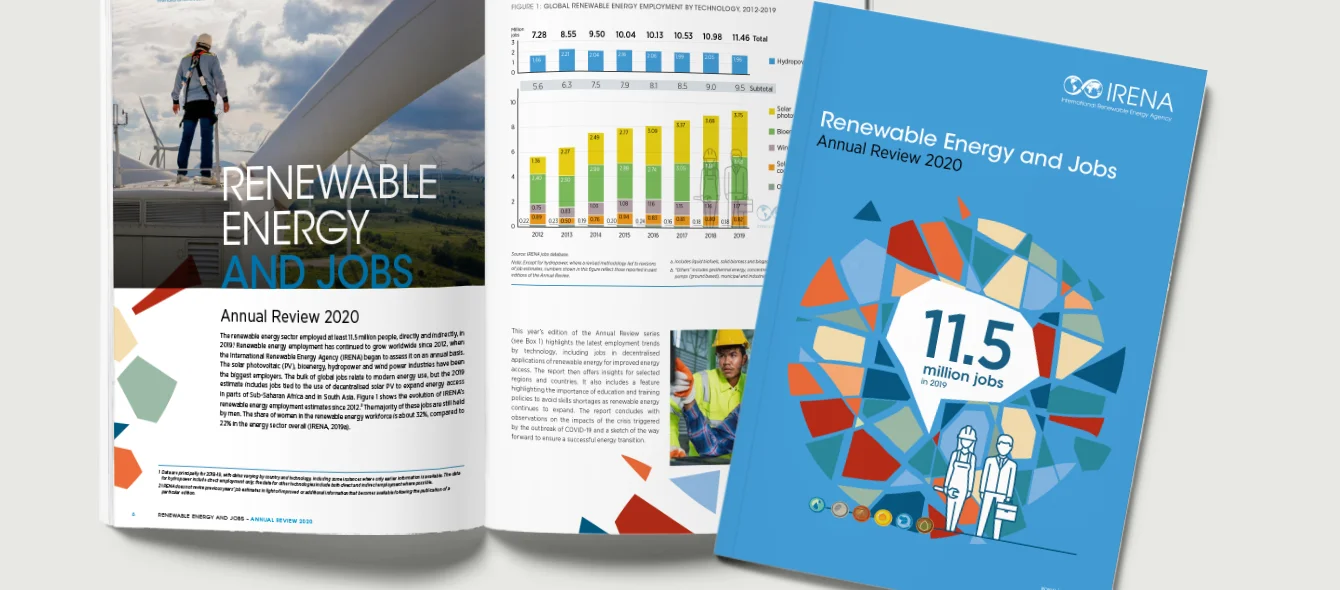As the corona pandemic keeps its stranglehold on the world, a trend that has long been looming on the horizon has persisted in this crisis-ridden year: renewables are the ultimate low-cost, flexible and resilient energy source. What’s more, they increasingly ensure employment the world over. This is the conclusion drawn by the most recent study by IRENA (International Renewable Energy Agency) entitled ‘Renewable Energy and Jobs – Annual Review 2020’, which puts the number of jobs in the renewables sector in 2019 at an estimated 11.5 million. Eight years ago, this figure stood at just under 7.3 million.
According to the study, the substantial growth of the global renewables sector was driven not only by the steady decline in costs, but also the ever-sharper focus on climate protection. “Renewable energy is a cost-effective source of new electricity which protects electricity markets and consumers from volatility, supports economic stability, and promotes sustainable growth.” confirms IRENA Director General Francesco La Camera.
Global renewable energy employment (2019)
Source: IRENASolar sector posts especially rapid growth
According to the energy agency, the lion’s share of jobs directly and indirectly associated with the renewables sector is primarily spread across biomass, hydro, solar and wind. An particularly big jump was made by solar technology, with jobs soaring to 3.75 million in 2019 from nearly 1.3 million in 2012. This represents a remarkable 175 percent increase.
Global employment (solar and photovoltaics only)
Source: IRENAChina was and remains the main driver of this growth. For years, the country has made leaps and bounds in developing forward-looking technologies and is expanding wind and – above all – solar energy like no other nation. While 87 percent of the global workforce is spread over a mere ten countries, nearly two-thirds work in China alone. According to the CNREC (China National Renewable Energy Centre) 2.2 million jobs were accounted for by the country, which leads the world in PV system manufacturing and installed capacity. IRENA has second and third place going to Japan (241,000 jobs) and the USA (240,000 jobs). Germany’s 29,000 direct and indirect labour force ranks the country ninth.
Top countries in solar pv employment (2019, © IRENA)
China's 2.2 mill. employees makes them the undisputed leader.No renewables, no future
Renewables still have tailwind when looking to a post-COVID future. As reported by en:former, the rise in renewable energy consumption witnessed during the crisis is an unexpected preview of the potential future electricity mix. Although all current forecasts in many areas are cloaked in great uncertainty especially owing to the persistent coronavirus pandemic, experts recommend that countries step up investment in renewable technologies. The IRENA study concludes that COVID-19 has underscored the need to introduce new political measures to promote expansion, pointing out that this is the only way to ensure that the world’s ambitious climate protection and sustainability goals can actually be achieved.
Photo credit: © IRENA
